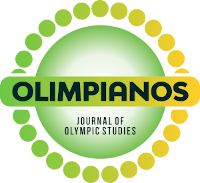Por que as mulheres correm? Motivações para correr uma meia-maratona entre corredoras locais do sexo feminino e turistas esportistas
DOI:
https://doi.org/10.30937/2526-6314.v2n3.id58Palavras-chave:
Motivos de participação em um evento de corrida, corredoras, meia-maratona, mulheres no esporte, eventos de corrida em massaResumo
O objetivo do estudo foi examinar as motivações para participar de uma meia maratona entre mulheres - corredoras locais e turistas esportistas - e também para avaliar as diferenças entre esses dois grupos de entrevistados. A maior parte da pesquisa diz respeito à motivação para correr entre os homens. Com o aumento da popularidade dos eventos de corrida em massa, a questão que incentiva as mulheres a se envolverem em atividades fÃsicas, especialmente fora de seu local de residência, torna-se muito importante. A amostra foi composta por 214 mulheres que participaram da 6ª Meia Maratona de Poznan na Polônia. Para avaliar a motivação para participar do evento de meia maratona, utilizou-se um questionário autoconstruÃdo. Os resultados indicaram que as corredoras locais e as turistas esportistas têm formas semelhantes de motivação e significados semelhantes para a participação no evento, com algumas diferenças significativas. Também foi examinado o perfil sociodemográfico de uma meia maratona do sexo feminino. Em geral, os resultados do presente estudo fornecem uma compreensão da motivação para participar de um evento de meia maratona em diferentes grupos de mulheres. A pesquisa atual sobre a motivação dos participantes do evento de corrida teve como objetivo determinar quão alguns aspectos são significativos. Esses aspectos não foram apenas uma disposição para se manter em forma, saudável e magra, mas também para construir relacionamentos sociais e buscar as experiências e emoções que acompanham o esporte recreativo. Esses resultados podem ser úteis para os gestores esportivos e o governo da cidade para analisar o comportamento do consumidor e utilizar os resultados no planejamento estratégico, marketing e implementação da cultura fÃsica em conexão com grandes organizações de eventos esportivos.
Referências
1 Papanikos G. The economic effects of a marathon as a sport tourism event. Athens Journal of Sports. 2015; 1: 225.
2 Chappelet JL. Heritage sporting events and place marketing, In: Plevnik M, Ratar I, Pisot R. and Ovid A, editors. Sustainable development of sport tourism. Annales University Press; 2015.
3 Pinson J. Heritage sporting events: Theoretical development and configurations. Journal of Sport & Tourism. 2017; 21(2): 133-152.
4 Taks M. Governance in sport and the Olympic Movement: The future of mega-sport events. In: International Olympic Academy – 12th International Session for Educators of Higher Institutes of Physical Education. Ancient Olympia-Greece; 2017.
5 Report Physical Activity of Poles, 2017 [cited 2019 Jul 20]. Available from: https://www.msit.gov.pl/pl/sport/badania-i-analizy/aktywnosc-fizyczna-spol/575,Aktywnosc-fizyczna-spoleczenstwa.html
6 Schulze G. Die Erlebniz-Gesellschaft. Kultursoziologie der Gegenwart. Frankfurt am Main: Campus-Verlag; 1992.
7 Zduniak A. Event as a postmodern form of participating in social life. Roczniki Nauk Społecznych. 2010; 38(2): 207-234.
8 Zuckerman M. The sensation seeking motive. Prog Exp Pers Res. 1974; 7:79–148.
9 Gracz J, Walczak M, Tomczak M. Search for sensations as a trend in contemporary sports and recreation activities. Sport and recreation versus the challenges of modern civilization. University of Szczecin; 2011.
10 Stempien J. Running, sightseeing and the middleclass – a few sociological comments and observations on running tourism. In: Kazimierczak M. (ed.). Sports inspirations in cultural tourism. Poland: University of Physical Education in Poznan; 2016.
11 Crawford R. Healthism and the medicalization of everyday life. International Journal of Health Services. 1980; 10 (3):365-388.
12 Borowiec A, Lignowska I. Is the ideology of healthism a distinctive feature of the middle class in Poland? Culture and Society – Sport in Culture. 2012; 56(3): 95-111.
13 Gibson H, Attle S, Yiannakis A. Segmenting the active sport tourism market: A life-span perspective. Journal of Vacation Marketing. 1998; 4(1): 52-64.
14 Ross D. Developing sports tourism. National Laboratory for Tourism. Illinois: University of Illinois; 2001
15 Roberts C. Sport and adventure tourism. In: Robinson P, Heitmann S, Dicke P. Editors. Research Themes for Tourism. Oxfordshire-Cambridge, UK: CABI Publisher; 2011.
16 Ogles BM, Masters KS. A Typology of marathon runners based on cluster analysis on motivations. Journal of Sport Behaviour. 2003; 26:69-85.
17 Krouse R, Ransdell L, Lucas S, Pritchard M. Motivation, goal orientation, coaching and training habits of women ultrarunners. Journal of Strength and Conditioning Research. 2011; 25(10): 2835–2842.
18 Ogles BM, Masters KS. Obligatory running and gender: An analysis of participative motives and training habits. International Journal of Sport Psychology. 1995; 26: 233-248.
19 Freyer W, Gross S. Tourismus und Sport-Events. Dresden, Germany: FIT Forschungsinstitut für Tourismus; 2002.
Downloads
Downloads
Publicado
Edição
Seção
Licença
Os autores autorizam que outros copiem e redistribuam o material em qualquer suporte ou formato. Remixar, transformar, e criar a partir do material. Não pode usar o material para fins comerciais.






